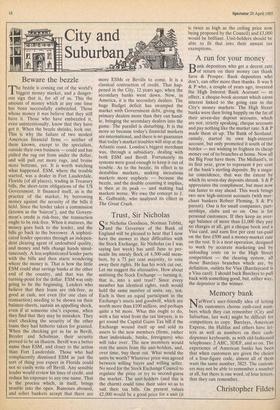Trust, Sir Nicholas
Q ir Nicholas Goodison, Norman Tebbit, Oand the Governor of the Bank of England will be pleased to hear that I now have the answer to their difficulties with the Stock Exchange. Sir Nicholas (as I was saying last week) has until June to per- suade his unruly flock of 4,500-odd mem- bers, by a 75 per cent majority, to vote away their rights. He has his work cut out. Let me suggest the alternative. How about unitising the Stock Exchange — turning it, that is, into a unit trust? Since every member has identical rights, each would hold the same number of units: say, ten. Each is then an equal participant in the Exchange's assets and goodwill, which are worth more than £100 million, and perhaps quite a bit more. What this ought to do, with a fair wind from the tax lawyers, is to get round the Capital Gains Tax bill if the Exchange wound itself up and sold its assets to the new members (firms, rather than individuals, banks, foreigners) who will take over. The new members would rent the assets from the unit-holders, and, over time, buy them out. What would the units be worth? Whatever price was agreed between willing buyer and willing seller. No need for the Stock Exchange Council to regulate the price or try to second-guess the market. The unit-holders (and this is the charm) could time their sales so as to suit their tax bills. On present values £2,000 would be a good price for a unit (it is twice as high as the ceiling price now being proposed by the Council) and £3,000 would be brilliant. Unit-holders should be able to fit that into their annual tax exemptions.














































 Previous page
Previous page